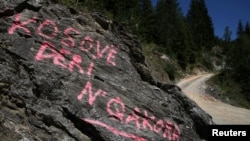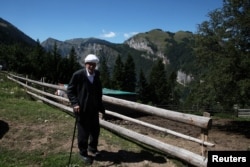High in the Cursed Mountains that span Kosovo and Montenegro, lumberjack Rame Elezaj and his family have earned a living from their trees for decades.
But if Kosovo's parliament approves a border deal with Montenegro on Thursday, all 4.5 hectares of Elezaj's land will be designated in another country, while his house will remain in Kosovo.
"We have always used this land and Montenegro never had any issues, and now our government wants to give it away for free," the 61-year-old told Reuters.
For decades after World War II, villagers never viewed the administrative lines that crisscrossed Yugoslavia as anything but notional boundaries that had little impact on everyday life.
But years after that communist state was ripped apart by the Balkan wars in the 1990s, border disputes remain one of many difficulties in untangling the former Yugoslavia, along with ethnic hostility, violence and political gridlock.
With no border markers in the craggy 1,700-meter (5,600-feet) mountains, Elezaj believed all his land was in Kosovo, but has no documents to prove it.
Western allies have told Kosovo that clarifying borders with its ex-Yugoslav foes, including Montenegro, is a prerequisite to getting closer ties with the European Union, in particular securing visa-free travel.
But the deal between the two governments has sparked violent protests throughout Kosovo. Six people were arrested Tuesday on suspicion of launching a rocket-propelled grenade at parliament and nationalist lawmakers have released tear gas inside the chamber several times in protest.
The opposition says the agreement hands over some 8,000 hectares (20,000 acres) of territory to Montenegro, a claim the government denies.
"Kosovo is losing 8,200 hectares ... it is losing water sources and lakes," said Donika Kadaj Bujupi, a lawmaker from the biggest opposition party, Vetevendosje, and someone who has herself released tear gas inside parliament.
"We will defend the land with our blood," Elezaj said.
Vetevendosje has said it will do everything it can, both inside and outside parliament, to stop the assembly approving the border deal. The government also faces objections from a number of its own lawmakers who have said they will not back the deal.
Attention elsewhere
Kosovo broke from Serbia in 1999 during 11 weeks of NATO bombing to halt the killing and expulsion of ethnic Albanian civilians by Serbian forces trying to crush a two-year insurgency.
After almost a decade as a ward of the United Nations, the majority-Albanian territory declared independence in 2008. It has been recognized by more than 100 countries, including the major Western powers, but not Serbia and its big-power ally Russia or several EU members such as Spain.
It still struggles with the legacy of war. Corruption and poverty are rife, and a gradual improvement in relations with Serbia, mandated by the EU, is fraught with setbacks.
EU officials have used a policy of “carrots and sticks” to guide governments both in Pristina and in Belgrade toward closer integration with the EU, with the Montenegro border deal just the latest requirement.
But EU diplomats say Kosovo may have to wait longer to win visa-free travel, even if the agreement is ratified in time for a September debate in the European Parliament.
The bloc's attention is focused elsewhere, diplomats say, with some hoping to lift visas for Georgians ahead of an election there in October, while others want to focus on Turkey, crucial to stemming migrant flows to Europe.
"Nobody really talks about Kosovo all that much," one EU diplomat said, speaking on condition of anonymity.
The huge numbers of Kosovars claiming asylum in the EU — from where they are invariably deported — does not help its case to get visa-free travel and it is the last of the former Yugoslav republics still to win that privilege.
In the first quarter of 2015, nearly 50,000 Kosovars claimed asylum in the EU, mostly in Germany, more in that period than Syrians fleeing their civil war. EU countries consider most of them economic migrants, ineligible for asylum.
Border issues between Yugoslav republics remain unresolved 17 years since nearly a decade of wars ended in 1999. Even two EU member states — Slovenia and Croatia — still dispute over one part of the border going through the Adriatic Sea.






